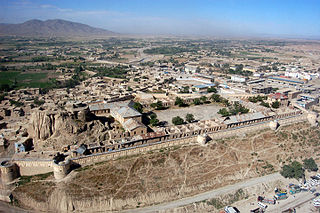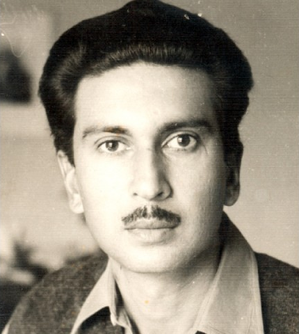
Pashtunistan is a region located on the Iranian Plateau, inhabited by the indigenous Pashtun people of Afghanistan and northwestern Pakistan, wherein Pashtun culture, the Pashto language, and identity have been based. Alternative names historically used for the region include Pashtūnkhwā (پښتونخوا), Pakhtūnistān, Pathānistān, or simply the Pashtun Belt.

Khost is one of the 34 provinces of Afghanistan located in the southeastern part of the country. Khost consists of thirteen districts and the city of Khost serves as the capital of the province. Historically, Khost used to be a part of Paktia and a larger region surrounding Khost is still referred to as Loya Paktia.

Paktia is one of the 34 provinces of Afghanistan, located in the east of the country. Forming part of the larger Loya Paktia region, Paktia Province is divided into 15 districts and has a population of roughly 623,000, which is mostly a tribal society living in rural areas. Pashtuns make up the majority of the population and a small percentage include Tajiks. Gardez is the provincial capital. The traditional food in Paktia is known as (dandakai) which is made from rice and mung bean or green gram.

The Yusufzai or Yousafzai, also referred to as the Esapzai, or Yusufzai Afghans historically, are one of the largest tribes of Pashtuns. They are natively based in the northern part of Khyber Pakhtunkhwa, to which they migrated from Kabul during the 16th century, but they are also present in parts of Afghanistan, including Kunar, Kabul, Kandahar and Farah. Outside of these countries, they can be found in Ghoriwala District Bannu, Balochistan Sibi (Akazai), Chagai (Hassanzai) and Rohilkandh.
The Tareen is a Pashtun tribe inhabiting southern Afghanistan, and western region of Pakistan.

Lodi is a Pashtun tribe from the Ghilji group of Pashtuns. In mythical genealogy, they have also been considered as being part of the Bettani tribal confederacy. The Lodi tribe consists of many sub-tribes, most of whom are now settled in the Tank, Frontier Region Tank, Lakki Marwat and Dera Ismail Khan districts of Khyber Pakhtunkhwa province of modern-day Pakistan. These tribes were nomadic for most of their existence and migrated to their present-day locations by crossing the Gomal Pass throughout different times in history.

Khalq was a faction of the People's Democratic Party of Afghanistan (PDPA). Its historical de facto leaders were Nur Muhammad Taraki (1967–1979), Hafizullah Amin (1979) and Sayed Mohammad Gulabzoy (1979–1990). It was also the name of the leftist newspaper produced by the same movement. The Khalq wing was formed in 1967 after the split of the party due to bitter resentment with the rival Parcham faction which had a differing revolutionary strategy.

Lieutenant General Shahnawaz Tanai was an Afghan politician and general officer who served as the Chief of General Staff of the Afghan National Army until his defection to neighbouring Pakistan following a failed coup d'état in 1990.

Hayat Mohammad Khan Sherpao, simply known as Hayat Sherpao, was a left-wing intellectual and socialist, who served as the 15th Governor of North West Frontier Province of Pakistan, as well as vice-chairman of Pakistan People's Party. Sherpao held important executive offices, including serving as the Interior minister and had held a number of provincial ministries of the North West Frontier Province. He was assassinated in 1975, and his death was blamed on a rival political party in the province - the Awami National Party of Khan Abdul Wali Khan.
Karlāṇī or Karrani is a Pashtun tribal confederacy. They primarily inhabit the FATA region of Khyber Pakhtunkhwa province of Pakistan and certain parts of eastern Afghanistan. In the 16th century the Karlani founded the Karrani dynasty, the last dynasty to rule the Bengal Sultanate.

The Mullagori or Mulagori or Malagori is a Pashtun tribe present in Khyber District, tribal areas in Khyber Pakhtunkhwa, Pakistan. Historically, they are one of the smallest tribes of ethnic Pashtuns. They are considered as a sub-tribe of Momand Pashtun Ghoryakhel confederacy.

The Mangal are a tribe of the Afghan or Pashtun people residing in eastern Paktia and adjacent Khost provinces of Afghanistan, and in the town of Tari Mangal, district Kurram, Pirdil Khel, Fatima Khel and Surrani of Bannu Pakistan. Their land constitutes the northeastern part of the Loya Paktia region. The Mangals descend from Karlani Pashtun lineage.

The Khugyani, Khogyani or Khogiani tribe is one of the Karlāṇī tribes of the Pashtun people. The tribe originated in the Khogyani district in Nangarhar province of Afghanistan. The Khogyani District is in eastern Nangarhar province of Afghanistan, near the city of Jalalabad and the Kōh-i-Safēd.

Lōya Paktiā is a historical and cultural region of Afghanistan, comprising the modern Afghan provinces of Khost, Paktia, and Paktika, as well as parts of Logar and compromises Kurram, Bannu and Waziristan of Khyber Pakhtunkhwa. Loya Paktia is vaguely defined by a common culture and history that is connected to the local indigenous tribes that reside in the region. Particular styles of clothing, articles of clothing, turban styles, turban cloth colors, dialects of Pashto language, etc. may sometimes be associated with specific tribes indigenous to Loya Paktia and thus integrate themselves into regional culture. For instance, a Pashtun tribesman from Loy Kandahar may quickly recognize a Pashtun from Loya Paktia based upon his turban style and color. Likewise, a Pashtun from Loya Paktia may recognize someone from Loy Kandahar based upon his unique style of collarless kameez (shirt) with specific embroidered patterns on the front. There are many subtle and intricate cultural indicators of this type that are not recorded in any known written history but simply known and observed by the tribesmen of the various Pashtun regions of Afghanistan and Pakistan.
The Chamkani, is a sub-tribe of Ghoryakhel Pashtuns. According to Muhammad Hayat Khan, author of Hayat-i-Afghani Chamkani are descendants of Ibrahim Ghoria. They are also related to Mohmand, Daudzai and Khalil through their Sarbani descent.
Barech is a Pashtun tribe in southern Kandahar province of Afghanistan. The Barech live primarily in Shorawak District.
Sheikh Muhammad Rohani(1220-1305 AD)(Pashto:شيخ محمد روحانى) also known as Shah Muhammad Rohani and Rohani Ba Ba was a Sufi cleric born around 1220 AD. The cleric, whose shrine in southern Afghanistan attracts thousands of Sufi visitors every year, is said to have migrated to current day Afghanistan in the later parts of the 13th century AD during the decline of the Abbasid Caliphate in Baghdad. He was a disciple of the renowned Sheikh Rukn-e-Alam.

The Banuchi/Bannuzai, Shitak, or Banusi, Banisi is a prominent tribe of Pashtun people which has the reputation of being one of the most warlike amongst the Pashtun people.They are settled in Bannu, Dera Ismail Khan, North Waziristan and Kurram of Pakhtunkhuwa, some members of which are settled in Paktia, Paktika,Khost and Injil of Herat, Afghanistan. Shitak was the name of his ancestors. Hence, according to Pashtun traditions, his descendants are known as Shitaks.However they are famous by their nickname like Banuchi or Banusi and these people call themselves Banisi, because the name of the Bannu area comes from Bin, a sinskrit word which is used for a forest,there were plenty of mulberry trees and Shisham trees. Later on, it evolved into Bana and then to Bani. Even local people and the surrounding people used the same names that are Bana or Bani for Bannu currently.. The Banuchis descend from the Shitak superclan of the larger Karlani tribe.

The 1990 Afghan coup d'etat attempt occurred on March 6, 1990, when General Shahnawaz Tanai, a hardline communist and Khalqist who served as Minister of Defence, attempted to overthrow President Mohammad Najibullah of the Republic of Afghanistan. The coup attempt failed and Tanai was forced to flee to Pakistan.
Mashwani is Arab origin tribe mainly settled in different parts of Pakistan and Afghanistan, in addition to some other neighboring regions. They are Afghans by adoption and Arabs by descent. They use Mashwani, Banuri, Ludin, Kazmi, Roghani, Jafari as their surnames. Mashwanis played a vital role in fighting against Sikh Khalsa army.













